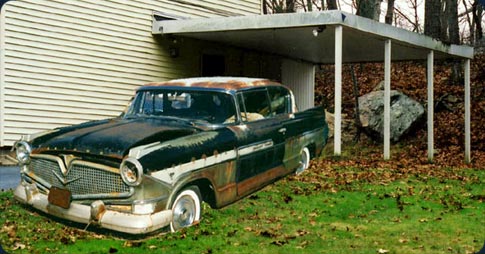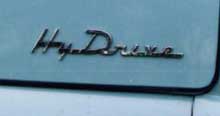We’ve studied Chrysler’s Fluid Drive before, both early and late versions. You’ll notice, however, that Plymouth is mentioned only in passing, having missed out on all the variants that fall under the Fluid Drive label. This is probably because Plymouth was an inexpensive car whose customers were least likely to spend money to avoid shifting. Too, the competition lacked such amenities, but once Chevrolet announced Powerglide in 1950 and Ford the Fordomatic in ’51 Plymouth was at a disadvantage.
Chrysler still didn’t have a fully automatic gearbox, but from 1951 had added a torque converter to make Fluid-Torque and Gryo-Torque. So for 1953, they put a torque converter ahead of the conventional three-speed and Plymouth got Hy-Drive.
Driving was simple. You just stuffed the transmission into high (remembering to use the clutch) and drove away. It was smooth, versatile and fast (well, faster than a Ford or Chevy if using only high gear). It offered good engine braking, which some fully-automatics didn’t, and there was enough creep in the torque converter to hold on hills. At $146 it was cheaper than Powerglide or Fordomatic, less expensive, even, than Fluid Torque. According to Jim Benjaminson’s excellent history Plymouth 1946-1959, by the end of the model year about a quarter of Plymouth production was delivered with Hy-Drive.
There was more to Hy-Drive than a simple torque converter. It was a hefty converter, 2.6 to 1 multiplication, highest in the industry. A beefier transmission was used, and a different engine block. From mid-1952, Chrysler torque converters had taken their oil from the engine, and Hy-Drive followed suit. Because of the additional torque converter housing, ahead of the clutch, a new floor pan was needed, so interchangeability with standard three-speed cars was nil. Like the other shiftless cars, a shift quadrant was essential for marketing purposes, even if it didn’t do anything, so Plymouth got one – with no markings except neutral.
Hy-Drive continued into 1954, and was fitted to such prestige cars as the Ghia-built Explorer. By April, though, Powerflite, the clutchless, shifting automatic, became available and Hy-Drive hit the low road.
I don’t remember seeing many Hy-Drive Plymouths back in their day. Nowadays, of course, they’re pretty scarce. A few years ago I saw this Cranbrook sedan in the Car Corral at Hershey, complete with Hy-Drive. I’ve always thought the 1953 Plymouths to be attractive, more so than the gaudier ’54s. They’re compact and contrite, and the Suburbans are very useful. Maybe I should have bought it. I’d still like to drive a Hy-Drive Plymouth some day.

